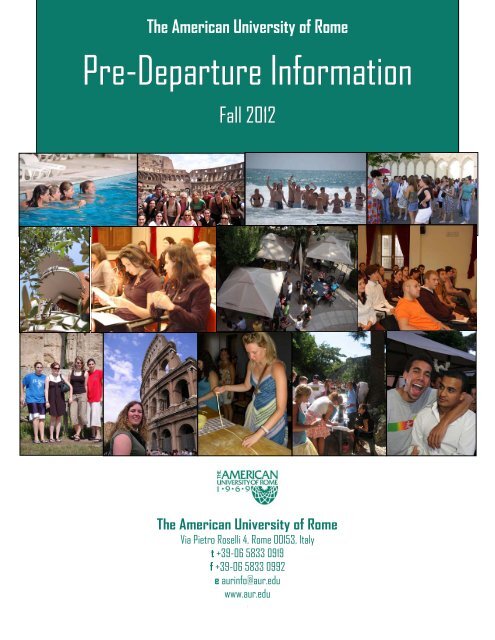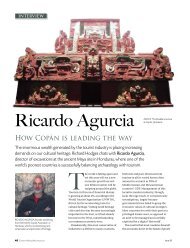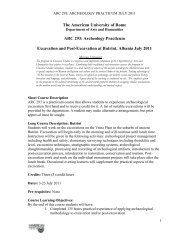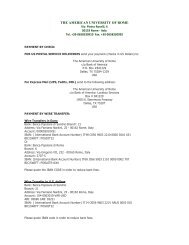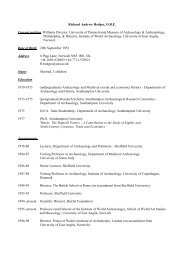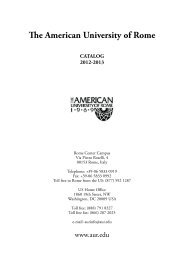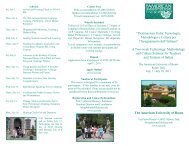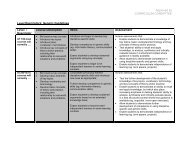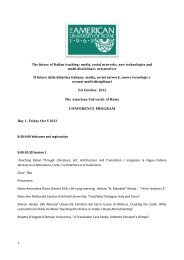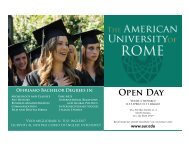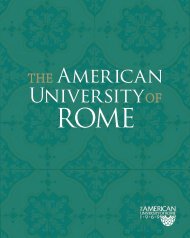Pre-Departure Information - The American University of Rome
Pre-Departure Information - The American University of Rome
Pre-Departure Information - The American University of Rome
Create successful ePaper yourself
Turn your PDF publications into a flip-book with our unique Google optimized e-Paper software.
<strong>The</strong> <strong>American</strong> <strong>of</strong> <strong>Rome</strong><strong>The</strong> <strong>American</strong> <strong>University</strong> <strong>of</strong> <strong>Rome</strong><strong>Pre</strong>-departure <strong>Information</strong> Fall 2012<strong>Pre</strong>-<strong>Departure</strong> <strong>Information</strong>Fall 2012<strong>The</strong> <strong>American</strong> <strong>University</strong> <strong>of</strong> <strong>Rome</strong>Via Pietro Roselli 4, <strong>Rome</strong> 00153, Italyt +39-06 5833 0919f +39-06 5833 0992e aurinfo@aur.eduwww.aur.edu1
IARRIVAL INFORMATIONA) Arrival at the <strong>Rome</strong> FiumicinoAirportYou must arrive in <strong>Rome</strong> on your scheduledarrival date. Your scheduled arrival is determinedby the university or study abroad programthat has accepted you to study at AUR.Contact your university or study abroad programto obtain your specific scheduled arrivaldate. Students should arrive in <strong>Rome</strong> themorning <strong>of</strong> their scheduled arrival date. Internationalflights generally arrive early morning.<strong>The</strong> <strong>American</strong> <strong>University</strong> <strong>of</strong> <strong>Rome</strong> will arrangea pick up at the Leonardo da Vinci InternationalAirport/Fiumicino for students in AURfacilitated housing and arriving at the AURdesk before 1:00 PM on their scheduled arrivaldate. You should exit customs and proceedto the "Left Luggage/Deposito Bagaglio"counter in the Arrivals Hall in Terminal3. This area is found by proceeding toyour right when you exit the customs/bagclaim area. (Note: "left luggage" refers to luggagestorage area not "left" as in left vs.right.) Look for the AUR staff who will beavailable to assist at 9.00AM.<strong>The</strong> <strong>American</strong> <strong>University</strong> <strong>of</strong> <strong>Rome</strong> can onlyarrange transit to <strong>Rome</strong> mid morning/earlyafternoon on your scheduled arrival date.<strong>The</strong>refore, if you arrive after this time frame,you will be expected to arrive independently tothe <strong>University</strong> during <strong>of</strong>fice hours.Most international flights from the US arrive inTerminal 3 <strong>of</strong> the Arrivals Hall. AUR representativeswill be waiting there holding a signmarked THE AMERICAN UNIVERSITY OFROME. If you arrive at <strong>Rome</strong>‘s ―second‖ airport,Ciampino, you will need to arrange foryour own transit to the university.<strong>The</strong> <strong>American</strong> <strong>University</strong> <strong>of</strong> <strong>Rome</strong><strong>Pre</strong>-departure <strong>Information</strong> Fall 2012Before departure you shouldChange at least $100.00 into EUROObtain an AT&T (or other reliable company)calling cardObtain an ATM card with international coding(must NOT be linked to a savings account)Obtain a multiple entry student visa from ItalianconsulatePrint this document and bring it with youto Italy!Lost Luggage - don‘t worry - it happens.Should your luggage get lost, report it to passengerservice before exiting customs. Leavethe university address and phone number withthe luggage service: <strong>The</strong> <strong>American</strong> <strong>University</strong><strong>of</strong> <strong>Rome</strong>, Via Pietro Roselli 4, 00153<strong>Rome</strong>, Tel. 06 5833 0919. Your luggage willmost likely be delivered from the airport in thenext few days.B) Students Not Arriving at <strong>Rome</strong>Fiumicino AirportUNIVERSITY ARRANGED HOUSINGYou must arrive in <strong>Rome</strong> on your scheduledarrival date. Students not arriving at <strong>Rome</strong>Fiumicino Airport who have reserved <strong>University</strong>arranged housing, should proceed directly to<strong>The</strong> <strong>American</strong> <strong>University</strong> <strong>of</strong> <strong>Rome</strong>, Via PietroRoselli 4, tel. 06 5833 0919 during <strong>of</strong>ficehours.IMPORTANT<strong>The</strong> <strong>of</strong>fice <strong>of</strong> AUR is open from 8.30am to5.00pm and students must be sure to arriveat AUR during those hours. If you arrive atAUR directly rather than at the airport for thescheduled pickup, please be prepared to waituntil the airport arrivals have been accommodated.You will be able to wait comfortably inthe AUR Campus until you can be escorted toyour apartment.If students arrive in <strong>Rome</strong> outside <strong>of</strong>fice hoursthey will have to make a hotel booking for thatevening and then contact the <strong>of</strong>fice <strong>of</strong> the <strong>University</strong>the next day. If you arrive prior toyour scheduled date, your accommodationis unavailable. <strong>The</strong>re can be no exceptionsmade to this policy. If you arrive subsequentto your scheduled date, you can expectsignificant waiting time before your can enteryour unit.2
<strong>The</strong> <strong>American</strong> <strong>University</strong> <strong>of</strong> <strong>Rome</strong><strong>Pre</strong>-departure <strong>Information</strong> Fall 2012TRAVEL INSTRUCTIONS to AURRoute ONE (to AUR from <strong>Rome</strong> Leonardoda Vinci - Fiumicino Airport). Studentsshould take the train from the airport terminalrailway station to TRASTEVERE STATION(approximate cost 8 EURO). Once on the trainthe Trastevere station is the seventh stop.Tickets for the train can be easily purchasedfrom automated vending machines, the ticketcounter or the little newspaper stand (theeasiest and fastest way) Students will needEURO currency. <strong>The</strong>re are two trains availablefrom the airport train station; board the metropolitanrather than the express non-stoptrain to the main Termini train station. Fromthe TRASTEVERE STATION you should thentake a taxi to AUR (approximate cost 10-15EURO).Route TWO (to AUR from Termini trainstation) Bus #75 goes directly to the <strong>University</strong>.<strong>The</strong> <strong>University</strong> is located between thestops <strong>of</strong> Via Dandolo/Calandrelli and ViaCarini. Either stop is less than 100 metersfrom the <strong>University</strong>. This would be approx.Fifteen (15) stops on the bus and should take20-30 minutes. Your landmark would be theancient wall <strong>of</strong> <strong>Rome</strong>, which you pass throughafter a long uphill climb subsequent to crossingthe Tiber River.INDEPENDENT HOUSINGARRANGEMENTSStudents who have made their own independenthousing arrangements should proceedby their own means to their accommodationsand join the AUR program accordingto the following schedule:Schedule <strong>of</strong> Arrivals EventsWeek (Mon-Fri) Aug 27-31, 2012Arrival in <strong>Rome</strong>: housing check-inMandatory Orientation sessionSATURDAY, September 1, 2012Semester kick <strong>of</strong>f eventMONDAY, September 3, 2012Course instruction begins*A more detailed schedule will be provided at yourarrival.*You must arrive in <strong>Rome</strong> on your scheduled arrivaldate. Your scheduled arrival is determined by the universityor study abroad program that has accepted youto study at AUR. Contact your university or studyabroad program to obtain your specific scheduled arrivaldate. A more detailed schedule <strong>of</strong> events will beprovided upon check-in.Route THREE (to AUR from <strong>Rome</strong> –Ciampino airport) This small airport is muchless accessible to the <strong>University</strong> by travelerswith substantial luggage than <strong>Rome</strong>‘s mainAirport (Leonardo Da Vinci-Fiumicino). <strong>The</strong>reare connecting buses and a nearby train stationas well as various commercial shuttle andtaxi services. Students are recommended tomake specific transit arrangements upon arrival.Route FOUR (Taxi) If students choose totake a taxi from Fiumicino airport directly tothe city you should expect to pay 45 EUROplus 1 EURO for each luggage. From the Terminitrain station, the fare should be approximately25 EURO. From the Ciampino airportthe fare would be 35 EURO plus 1 EURO foreach luggage. For taxi drivers the <strong>University</strong>"landmark" would be the park "VillaSciarra" or via Carini.3
IIUSEFUL INFORMATION<strong>The</strong> <strong>American</strong> <strong>University</strong> <strong>of</strong> <strong>Rome</strong><strong>Pre</strong>-departure <strong>Information</strong> Fall 2012Student Visa and Stay PermitProceduresStudent VisaAll non-European Union students are requiredby law to obtain a student visa fromthe Italian consulate in their home countrybefore departing for Italy. Without a validstudent visa students cannot obtain theirPermit to Stay.Permit to stayUpon arrival in <strong>Rome</strong>, all foreign students,including European Union citizens, must obtaina permit to reside in Italy (Permesso diSoggiorno per Studio). <strong>The</strong> permit is issuedby the local police authorities (Questura).<strong>The</strong> <strong>University</strong> will provide relevant informationand assistance to you upon arrival tosecure your first stay permit. However, it isyour responsibility to comply with currentstay requirements and secure the applicabledocuments.Required DocumentsTo facilitate the process <strong>of</strong> obtaining thePermit to Stay, you must provide the following:1 photocopy <strong>of</strong> inside front cover <strong>of</strong> yourpassport (the one with your picture, signatureand identifying information)1 photocopy <strong>of</strong> your visa1 photocopy <strong>of</strong> health insurance1 photocopy <strong>of</strong> AUR enrollment letterstamped by the Italian Consulate<strong>The</strong> <strong>University</strong> will provide you with the appropriateforms, information and assistanceon the process.Students residing in housing not contractedthrough the <strong>University</strong> will have to apply fortheir permit at the appropriate police stationand are also required to present a copy <strong>of</strong>their rental agreement.4Safety IssuesGeneral Physical Security<strong>The</strong> university is in frequent contact withboth Italian law enforcement and <strong>Rome</strong>basedUS consular authorities, including theUS Regional Security Officer.Any plan <strong>of</strong> program closure or evacuationwould be in response to specific recommendationfrom US consular <strong>of</strong>ficials. Severalsenior staff members have direct contactwith the US consular services and will be ableto rapidly disseminate information to the AURcommunity in the event <strong>of</strong> an emergency orimportant political developments in Italy orthe world.<strong>The</strong> university is located in a well-patrolledand exceptionally quiet area <strong>of</strong> <strong>Rome</strong> in closeproximity to embassies and embassy residences.As recommended by security assessments,no large signs identify the university.In addition, the university maintains severalsecurity precautions to ensure the highestlevel <strong>of</strong> safety for its community, including: Armed guard surveillance. 24-hour camera surveillance <strong>of</strong> theuniversity premises and perimeter anda daily review <strong>of</strong> the tapes. Personalized ID cards to allow admissionto the university premise.(Security personnel escort visitors totheir destination.) Mail handling procedures, includingthe capacity to screen packages forexplosives in conformity to pr<strong>of</strong>essionalrecommendations. Fire or premises evacuation plans reviewedin staff meetings. Fire extinguishers and safety equipment. Additional security measures that arenot readily visible. <strong>The</strong> review <strong>of</strong> safety procedures re-
<strong>The</strong> <strong>American</strong> <strong>University</strong> <strong>of</strong> <strong>Rome</strong><strong>Pre</strong>-departure <strong>Information</strong> Fall 2012garding campus security, mail handlingand other matters is continuousand involves ongoing consultationwith both government and private securitypr<strong>of</strong>essionals.<strong>The</strong> university has implemented proceduresto communicate important information rapidlyto students, faculty, staff and othermembers <strong>of</strong> the university community. <strong>The</strong>Student Life Office communicates importantinformation to students and other people responsiblefor school and study abroad programs.Individual SecurityWhile the university cannot guarantee theindividual security <strong>of</strong> students, staff, facultyor visitors, it has put several importantstrategies in place in order to maximizesafety.As a G8 member nation Italy‘s overall level <strong>of</strong>physical safety is high. Incidents <strong>of</strong> violentcrime (e.g., assault, rape, murder) are extremelylow. Italian police are known fortheir expertise in maintaining civil order andcrowd control.<strong>The</strong> <strong>American</strong> <strong>University</strong> <strong>of</strong> <strong>Rome</strong> encouragesall its students periodically to check the U.S.Department <strong>of</strong> States webpage (http://travel.state.gov/) for latest advisories andtravel warningsHousingStudents may choose to enroll in the university-facilitatedhousing program in conjunctionwith our housing agents or providers.<strong>The</strong> university requires that the agents respectagreed-upon standards with regard tosafety and hygiene. Students are housed inapartments in well established residentialareas and are to conduct themselves as residentsrather than tourists. Emergency contactinformation is prominently posted ineach unit as well as listed in the AUR StudentHandbook and your emergency phone numbercard. Phones are provided in the apartments.Emergency Telephone NumberStaff members explain emergency responseat length in mandatory orientation sessions(see below). In the event <strong>of</strong> emergency, theuniversity maintains an emergency numberthat is ready to help in emergency situationsoutside normal campus hours during semesters.Student-Specific <strong>Information</strong><strong>The</strong> university Student Life Office <strong>of</strong>fers valuableinformation and basic assistance. Forexample, the <strong>of</strong>fice maintains a library <strong>of</strong>guides and websites for visitors to <strong>Rome</strong> andItaly. <strong>The</strong> Student Handbook and other universitypublications contain a good deal <strong>of</strong>valuable information on daily life in <strong>Rome</strong>,including basic security. For example, it detailshow and where to file a police report orreplace a lost passport. <strong>The</strong> university enforcesa sexual harassment policy and astringent Student Code <strong>of</strong> Conduct, whichimposes sanctions upon students engaged inundesirable behavior, found in the StudentHandbook.All students are required to provide an emergencycontact person and phone number.Orientation SessionUpon arrival students attend an orientationsession in <strong>Rome</strong>. Practical advice and informationis provided on a range <strong>of</strong> topics, including: Crime Public transportation, automobiles andmotorbikes Stress and culture shock Health care Alcohol and illegal drugs Italian culture and social norms Housing Shopping Traveling Telephones BankingStudent Code <strong>of</strong> Conduct<strong>The</strong> <strong>Rome</strong> orientation reinforces informationalready reviewed by the home university‘sstudy abroad <strong>of</strong>fice before departure for<strong>Rome</strong>.5
<strong>The</strong> <strong>American</strong> <strong>University</strong> <strong>of</strong> <strong>Rome</strong><strong>Pre</strong>-departure <strong>Information</strong> Fall 2012Medical Issues, Injury or IllnessAs a G8 member Italy‘s level <strong>of</strong> health careand overall hygiene is excellent. <strong>The</strong>re are nospecial health risks and no special immunizationsor inoculations are required for entryinto Italy from most countries.In the event <strong>of</strong> student illness or injury, thestaff member manning the emergency phoneis available to assist the student in obtainingappropriate medical care. In such an event,the Dean <strong>of</strong> Students advises the home universityor sending study abroad <strong>of</strong>fice. Parentsand guardians and, within legal constraints,the emergency contact will be advised.Additional assistance is provided in theevent <strong>of</strong> a medical evacuation.For non-emergency situations the StudentLife Office can be consulted during normalbusiness hours.Student Safety AdvicePersonal Safety Don‘t leave your personal belongingsunattended or with strangers Don‘t leave your drinks at bars unattended—ifyou have left them unattended,the embassy consulate generalrecommends you do not consumethem Be especially aware <strong>of</strong> your belongingsin crowded places like publictransportation and on night trains Don‘t leave your apartment doors orwindows unsecured Employ the buddy system—alwayshave a sober friend with you Cell phones are invaluable in a case <strong>of</strong>emergency Avoid being on your own during nighttime Do not invite strangers to your apartmentor enter the apartment <strong>of</strong> astranger Do not accept drinks or rides fromstrangers Always carry your cell phone and aphone card with youTravel Safety While traveling, keep your money anddocuments in two different places Always leave your travel plans withsomeone you trust Check periodically the US Embassywebsite (www.usembassy.it) alerts strangers Always carry your cell phone and aphone card with youWebsites on Security Issues www.state.gov/travelwarnings.html www.state.gov (U.S. Department <strong>of</strong> Statewebsite) http://usembassy.state.gov http://travel.state.gov/travel/tips/safety/safety_1747.htmlNearest <strong>American</strong> EmbassyVia Veneto 121, <strong>Rome</strong>Tel: 06 46741<strong>University</strong> Emergency Number348 08 09 357<strong>The</strong> <strong>University</strong> emergency number is ready tohelp you in emergency situations outside normalcampus hours during semesters. However,you should use it only in the event <strong>of</strong>genuine non-housing emergencies.Housing emergencies are to be brought to theattention <strong>of</strong> the housing agency. You will findthe necessary numbers in your apartment andthe Student Handbook.Italian Emergency numbersPolice 113 (equivalent to 911)Carabinieri 112Ambulance 118 or 06 5510Fire brigade 115Do a health check-up before leavingBefore leaving for Italy, visit your dentist and/or physician for any routine visits you mightotherwise miss while overseas, and especiallyfor any existing concerns you might have.Never assume your study abroad/travel insurancewill cover expenses for a pre-existingcondition.IMPORTANT6
<strong>The</strong> <strong>American</strong> <strong>University</strong> <strong>of</strong> <strong>Rome</strong><strong>Pre</strong>-departure <strong>Information</strong> Fall 2012Health ServicesDoctor at AURA medical doctor is available on campus tovisit with students Monday through Thursday.<strong>The</strong>re is no additional cost for this service.PharmaciesIn <strong>Rome</strong> and throughout Italy, pharmaciesare marked with a red or green neon crosssign. <strong>The</strong>y are open generally from 8:30amto 1:00pm and then from 4:00pm from7:30pm. <strong>The</strong>re is a rotation system fornights and holidays and each pharmacy liststhe closest open pharmacy. In Italian pharmaciesyou can find over-the-counter medicinefor minor illnesses like colds and pains.<strong>The</strong> pharmacy closest to the <strong>University</strong> is onVia Carini 44, near the corner bar (in front<strong>of</strong> the first 44 bus stop on Via Carini). <strong>The</strong>International Pharmacy, located in PiazzaBarberini, has English-speaking pharmacistsat 06 48 25 456. <strong>The</strong>re are 24-hour pharmacieslocated at the main train station, inPiazza Risorgimento 44 and Via Nazionale228.Emergencies and Public HospitalsIf you require medical attention, all hospitalshave a first aid and emergency room(pronto soccorso). If there is an emergencyand you need immediate help, you shoulddial 113 or 118 for police or ambulance assistance.In an emergency, an ambulancewill take the patient to the closest emergencyroom and, if hospitalization is necessary,the patient will be placed in the hospitalbest suited to treat the particular illnessor injury. Students who are not Italian citizensbut have an Italian insurance policy arecovered for emergency treatment in staterunhospitals. <strong>The</strong>re are several public hospitalswith emergency facilities throughout<strong>Rome</strong> including the areas where AUR and itshousing units are located.Private Clinics and International HospitalsIf you wish to be treated in a private clinic oran international hospital, you are responsiblefor payment. Consult your own private insurancefor reimbursement policies.<strong>The</strong> U.S. Embassy lists a variety <strong>of</strong> Englishspeaking doctors and the Student Life Officeassists students needing to locate internationalmedical pr<strong>of</strong>essionals in <strong>Rome</strong>.Italian CultureNo doubt shortly after arrival in <strong>Rome</strong> you willhave noted many differences from the familiarenvironment you have just left. If you are astudy abroad student it is precisely these differencesthat likely have drawn you to this experience.Expect and embrace both changeand difference. Keep an open mind. Understandthat Italian is the language <strong>of</strong> Italy andthat even if you have studied Italian, you willhave some difficulty communicating.Every culture has its own nuances and subtleties.Some are more evident than others. Avoidgeneralities about Italian culture – they arelikely inaccurate. Also know that generalizationsabout Italians and Italy are especiallyhard to accurately compose.While some examples <strong>of</strong> fairly widely heldgeneralizations such as devotion to and importance<strong>of</strong> family, importance <strong>of</strong> image andgrooming or the concept <strong>of</strong> moderation withrespect to food and drink are substantially correct,others are simply inappropriate and inaccurate.For example, since many retail storesare closed in the mid afternoon – don‘t concludethat Italians take a long ―siesta‖ andslowly flow along in life‘s current. While it maybe true that Italians, like all <strong>of</strong> us, enjoy theirleisure time, most Italians work six days aweek and Italy is one <strong>of</strong> the world‘s most innovativeand productive industrial countries.With respect to dating, the protocol you findin Italy may be very different than that towhich you are accustomed. Casual acquaintancesare rarely invited into the home; suchinvitations to acquaintances <strong>of</strong> the oppositesex may have clear implications here thatare not so obvious to you. Failure to fullyunderstand this could have disastrous consequences.7
<strong>The</strong> <strong>American</strong> <strong>University</strong> <strong>of</strong> <strong>Rome</strong><strong>Pre</strong>-departure <strong>Information</strong> Fall 2012It is also important to understand that many<strong>of</strong> the things associated with your appearanceand actions will identify your culturalorigin. For example, did you know <strong>American</strong>sare <strong>of</strong>ten readily identified by the type<strong>of</strong> backpack that they carry, the type <strong>of</strong>shoes that they wear (which typically do notchange seasonally), or the overcoat theydon‘t wear during the fall and wintermonths?AUR‘s best advice for student visitors to thiscountry is to observe the culture, study thelanguage, make an effort to fit in and appreciateit. Never engage in the type <strong>of</strong> behaviorthat would not be found acceptablein your home nation. Simple courtesy andrespect are tools that will never fail you.Culture ShockAdjusting to a new culture is not alwayseasy. Living away from family and friends,language barriers and different habits <strong>of</strong> thenew culture may make life seem stressfuland difficult. Going through a period <strong>of</strong> cultureshock – feeling angry, frustrated and/oremotional, or the more subtle tired, lost,edgy and/or sad – is normal and can bequite easily tackled by taking steps in adjustingto the new culture. Here are somestrategies to help combat the stress producedby culture shock.Get rest. Many students are already exhaustedbefore they even leave home, havingspent every possible moment with theirfamily and friends. <strong>The</strong> excitement at arrivaland discovery <strong>of</strong> a new city with new friendsfurther deprive a student <strong>of</strong> the rest neededto overcome jetlag and culture shock.Be patient. Living abroad, changing culturesand adapting to new situations takestime. Do not rush things and allow yourselfto feel sad about the things that you haveleft behind: your family, your friends, etc.Recognize the sorrow <strong>of</strong> leaving your homecountry, but learn to also accept the newculture you are in. Focus your power on gettingthrough the transition.Student PerspectiveLiving in <strong>Rome</strong> is an experience like no other. From the history<strong>of</strong> the city to the aesthetic beauty <strong>of</strong> the architecture,<strong>Rome</strong> is truly one <strong>of</strong> a kind. For the first few days after arriving,you will find yourself wandering around in awe, overwhelmedby the sights, sounds and smells <strong>of</strong> your new surroundings.As soon as you step <strong>of</strong>f the plane at the LeonardoDa Vinci airport, you will notice many things that are muchdifferent than what you are used to. Hoards <strong>of</strong> people crowdingaround the cash register at a café - lines don‘t exist inItaly. Taxi drivers screaming at each other in some undecipherabledialect, endless traffic jams, intense heat. Men inridiculously tight jeans. Who are these people?Throw away everything you take for granted back home -customer service, punctuality, efficiency. Things work differentlyhere, and at a much slower pace. <strong>The</strong> best way toadapt is to have an open mind, and be willing to acceptthings as they come. After all, the main reason most peoplecome to study here is to experience a new culture, and withthat comes an ability to change your perspective on life.<strong>The</strong>re are so many things to see and do in <strong>Rome</strong>, it wouldliterally take a lifetime to do it all. Once you have familiarizedyourself with your new home, remember what brought youhere-a sense <strong>of</strong> adventure, a thirst for knowledge, a culturalexperience.In order to live and study in <strong>Rome</strong>, you must have a goodbalance <strong>of</strong> activities. Since the majority <strong>of</strong> students at AURare semester study abroads, this leads to the notion <strong>of</strong> an allexpenses paid, four month vacation. While this is partiallytrue, it is important to keep up with one‘s studies, in order t<strong>of</strong>ully benefit from the AUR experience.Students may come here expecting to find easy courses thatthey can breeze through. However, this is not the case. AUR<strong>of</strong>fers challenging courses, and our pr<strong>of</strong>essors are highlytrained and experienced in their respective fields, and havehigh academic standards.A few words <strong>of</strong> advice for new and prospective students:One, time management skills are essential. If you plan ontraveling on the weekends, make sure that you are caughtup on your assignments, papers and group projects. This willsave you much stress the night before everything is due.Secondly, when a reading or project is assigned, do it assoon as possible, for the school weeks seem to fly by, andresponsibilities pile up very quickly. This will enable you toexplore the vibrant culture without sacrificing your grades. Ahappy medium can be found, and is based on your commitmentto what you choose to do.Although classes are taught within the walls <strong>of</strong> our beautifulcampus, there is a whole world <strong>of</strong> knowledge awaiting you inthe city. <strong>The</strong>re is so much to learn just wandering throughthe streets <strong>of</strong> the eternal city. So make sure that you studyhard, and everything else will fall into place.- Jake Campeau, Resident AUR Student, Communications Major8
<strong>The</strong> <strong>American</strong> <strong>University</strong> <strong>of</strong> <strong>Rome</strong><strong>Pre</strong>-departure <strong>Information</strong> Fall 2012Maintain contact with the new cultureand try to learn the language. Volunteerin community activities that allow you topractice the language that you are learning.This will help you fill your time, feel usefuland stress less about the language at thesame time.Maintain confidence in yourself. Followyour ambitions and continue your plans for thefuture. Learn to be constructive and find waysto live with the things that do not satisfy you100%. If you encounter an unfavorable environment,learn from it, but at the same timebe easy on yourself. Everything – includingyourself – cannot, will not and does not haveto be perfect.Maintain contact with your own ethnicgroup. Pay attention to relationships with yourfamily and friends. <strong>The</strong>y will serve as supportfor you in difficult times. This will give you afeeling <strong>of</strong> belonging and will reduce your feelings<strong>of</strong> loneliness and alienation. Do not forgetthe good things you already have!Develop a hobby. Relaxation and meditationare proven to be very positive for people whoare passing through periods <strong>of</strong> stress. Learn toinclude a regular form <strong>of</strong> physical activity inyour routine to help combat the sadness andloneliness in a constructive manner. Exercise,swim or take an aerobics class.Establish simple goals and evaluate yourprogress as time passes.<strong>The</strong> internet provides a myriad <strong>of</strong> informationon anxiety, depression and related conditions.For further information please consult the followingwebsites:http://www.ulifeline.org/http://www.nimh.nih.gov/http://www.nmha.org/http://www.half<strong>of</strong>us.comhttp://www.depression.com/Italy at a GlanceCurrencyIn 2002, euro coins/currency was introduced into manycountries in Europe including Italy. To check the latestconversion rate you can use www.xe.com .TimeItaly is six hours ahead <strong>of</strong> New York and nine hours ahead<strong>of</strong> California.Climate<strong>Rome</strong> enjoys mostly mild winters with some months <strong>of</strong>rainy spells, but there can be very cold periods, too. Springdoesn't usually arrive until late April or early May.Italian Business HoursItalian business hours <strong>of</strong>ten differ from the 9:00am to5:00pm U.S. standard. Most shops are open from 9:30amto 1:00pm, and re-open from 4:00pm to 7:00pm. <strong>The</strong>reare also Monday morning and Wednesday/Thursday afternoonclosures for some businesses. Working hours vary foreach business and you should inquire about the specificschedule for any location <strong>of</strong> interest.Italian FoodItaly is still a country in favor <strong>of</strong> the ―slow food‖ cultureand Italians traditionally spend a lot time purchasing, preparingand eating good food. <strong>The</strong>refore, instead <strong>of</strong> bigsupermarkets, you will find a lot <strong>of</strong> small ―corner‖ shopsthat are specialized in meat, fish, bread, fruit or other foodcategory. <strong>The</strong>re are also centralized supermarkets that sella broader variety <strong>of</strong> food and other household items.Italians normally have a light breakfast at the bar. Breakfastincludes a c<strong>of</strong>fee or a cappuccino and biscotti(cookies) or un cornetto (a pastry). Lunch is generallyserved between 1 and 2.30 pm and <strong>of</strong>ten consists <strong>of</strong> aprimo piatto (first course like salad, soup, rice or pasta).Some people may opt for a panino (sandwich) at lunchand make dinner their main meal. Dinner is served around8-9 pm and <strong>of</strong>ten includes a first and a second course(meat, fish and a side order <strong>of</strong> vegetables) that may befollowed by fruit, dessert and c<strong>of</strong>fee.Every Italian region (there are 20 <strong>of</strong> them) has its owntypical cuisine: one <strong>of</strong> your goals could be to have a taste<strong>of</strong> all <strong>of</strong> them! Roman cooking is fundamentally very simple:a few ingredients make up the dishes and meat andfish are most <strong>of</strong>ten baked or grilled. Typical Roman dishesinclude pasta: fettuccine, spaghetti, and potato gnocchi.Milk-fed lamb (abbacchio) and Mediterranean fish are <strong>of</strong>tenused ingredients as well as sheep‘s milk cheese andfresh ricotta. Typical wines are those <strong>of</strong> the Castelli Romani,southeast <strong>of</strong> <strong>Rome</strong>.9
<strong>The</strong> <strong>American</strong> <strong>University</strong> <strong>of</strong> <strong>Rome</strong><strong>Pre</strong>-departure <strong>Information</strong> Fall 2012World Citizen GuidePractical advice for <strong>American</strong>s traveling abroadLook. Listen. Learn.New places mean new cultures and new experiences. Don‘t justshop. See the sights, hear the sounds and try to understand thelives people live.Smile. Genuinely.It‘s a universal equalizer.Keep religion private.Globally speaking, religion is not something you wear on yoursleeve. Often it is considered deeply personal—not public. Somemay have no knowledge <strong>of</strong> the Bible, nor is it appropriate to tellthem about it unless you are a pr<strong>of</strong>essional missionary identified assuch.Be quiet.Less is more. In conversation match your voice level to the environmentand other speakers. A loud voice is <strong>of</strong>ten perceived as abragging voice. Casual pr<strong>of</strong>anity is almost always considered unacceptable.Think big. Act small. Be humble.In many countries, boasting is considered very rude. It‘s easy toresent big, powerful people. Assume resentment as a default andplay down your wealth, power and status. When <strong>American</strong>s meeteach other for the first time, our job (and implied status) is a keypart <strong>of</strong> ―who‖ we are, and how we introduce ourselves. This is lessimportant elsewhere, and can be perceived as braggadocio.Live, eat and play local.Once you get to know other <strong>American</strong>s, don‘t start ignoring localsyou knew before. Most people believe that <strong>American</strong>s have themost fun when they are in their own company. Prove them wrong.<strong>The</strong> world is full <strong>of</strong> interesting and exciting things, people andplaces you might never have heard <strong>of</strong>. Take some <strong>of</strong> it in.Be patient.We talk fast. Eat fast. Move fast. Live fast. Many cultures do not. Infact, time is understood very differently around the world. In theshort term, speed and instant satisfaction are less important thanenjoying a new culture.Celebrate our diversity.Everybody abroad may not be ware <strong>of</strong> occurrences that are obviousfor you (movies, music, baseball, Super Bowl winners etc.) Try t<strong>of</strong>ind a few topics that are most important in the local popular culture.Try the language.Try to speak some <strong>of</strong> the language even if the only thing you cansay is ―Hello.‖ and ―Thank you‖. It‘s okay to sound like a child.Making the effort is more endearing than <strong>of</strong>f putting.Refrain from lecturing.Whether on pollution, energy usage or the environment, it‘s not apolite stance. Nobody likes a know-it-all, and nobody likes a wholenation <strong>of</strong> them. Rightly or wrongly the U.S. is seen as appointingitself as policeman, judge and jury to the world. Be aware <strong>of</strong> thisperception and try to understand other viewpoints.Dialogue instead <strong>of</strong> monologue.When you‘re talking about the U.S. and your life there, ask peopleyou‘re visiting how what you‘ve said compare to what they do andhow they live in their country.Use your hands. Watch your feet.Gestures are a powerful language in any culture. Gestures are easierto learn than a language. Study up on them. Combine a basicknowledge <strong>of</strong> gestures with some very basic language to help youcommunicate better and more quickly.Leave the clichés at home.Our clichés <strong>of</strong>ten don‘t mean much or maybe anything to people <strong>of</strong>other cultures and they are difficult to translate.Be proud, not arrogant.People around the world are fascinated by the U.S. and the lives we<strong>American</strong>s live. <strong>The</strong>y admire our openness, our optimism, our creativityand our ―can-do‖ spirit. But that doesn‘t mean they feel lessproud <strong>of</strong> their country and culture. Be proud <strong>of</strong> being an <strong>American</strong>,but resist any temptation to present our way as the best way or theonly way.Check the atlas.You may not believe anyone could confuse ―Australia‖ with―Austria,‖ but it happens. Everyone‘s home is important to them.It‘s helpful if you familiarize yourself with local geography.Agree to disagree respectfully.Surely, there are people who object to actions or activities <strong>of</strong> ourgovernment, our industries and our culture. Not every objection isthe same. Listen politely. <strong>The</strong>n respond appropriately.Talk about something besides politics.Make yourself aware <strong>of</strong> the political environment <strong>of</strong> the region butdon‘t <strong>of</strong>fer a view if you don‘t have to. If pushed, ask the peoplewith whom you‘re having a conversation what their thoughts are.Listen first. <strong>The</strong>n speak. And leave politics alone if you can. Speak<strong>of</strong> culture, art, food or family if you need another topic.Be safety conscious, not fearful.If you went to certain parts <strong>of</strong> any city in the U.S., you‘d watch yourwallet and make sure you had your wits about you. So why shouldit be any different anywhere else?Dress for respect.<strong>American</strong>s are fundamentally a casual people. Jeans, T-shirts andsneakers work for many <strong>of</strong> us much <strong>of</strong> the time, but there are peoplein other countries that believe such casualness is a sign <strong>of</strong> disrespectto them and their beliefs. Check out what is expected andbring scarves, headwear or whatever might be required.Know some global sports trivia.Many countries don‘t play or watch <strong>American</strong> sports. So avoidfilling your conversations with U.S. sporting allusions. <strong>The</strong>re‘s agood chance people will not understand.Keep your word.If you say that you will e-mail, find that book or baseball cap andsend it, then make sure that you keep your promises.Show your best side.<strong>American</strong>s are a kind and generous people. You can help dispel thestereotype <strong>of</strong> Ugly <strong>American</strong>; impress people with your kindness,curiosity and fair nature.Be a traveler, not a tourist.Before you touch down in another country, learn as much as youcan about it. Go beyond the guidebooks and pick up some <strong>of</strong> themusic and the literature <strong>of</strong> the land. If you can, rent some moviesfrom that country. Go online and search for information about theplaces you want to visit. You can get a great start through theresources we‘ve put together at the World Citizens Guide website.www.worldcitizensguide.orgHave a wonderful trip!Make new friends. Bring back the best <strong>of</strong> the world and leave alittle <strong>of</strong> the best <strong>of</strong> yourself wherever you go. Share this WorldCitizens Guide with a friend._________________________________________________This information is the work <strong>of</strong> volunteers who make upBusiness for Diplomatic Action.10
<strong>The</strong> <strong>American</strong> <strong>University</strong> <strong>of</strong> <strong>Rome</strong><strong>Pre</strong>-departure <strong>Information</strong> Fall 2012HousingGood Neighbor Policy<strong>The</strong> apartments used by <strong>The</strong> <strong>American</strong> <strong>University</strong><strong>of</strong> <strong>Rome</strong> housing program are differentfrom college dormitory and apartmentliving in the United States. As a result, yourbehavior and demeanor must reflect thisdifference. As members <strong>of</strong> a community,you will have responsibilities to the citywhere you live and to your neighbors. Youshould strive to enhance the quality <strong>of</strong> lifeand safety <strong>of</strong> the neighborhood you share.As first impressions are lasting, your arrivalis critical in establishing good relations withyour new Italian neighbors. Students arestrongly advised to adjust to the local timezone as quickly as possible and to beacutely aware <strong>of</strong> the fact that those living inthe neighboring apartments rightfully expectto be able to sleep as well as to live within apeaceful environment.To help maintain good relations with yourneighbors, keep in mind that you are part <strong>of</strong> acommunity and your actions affect yourneighbors. Although your residency is temporary,recognize that most <strong>of</strong> your neighborsare living in their primary residence which theyown. Please be sensitive to the lifestyle <strong>of</strong> yourneighbors. Most residents enjoy the arrival <strong>of</strong><strong>American</strong> students and you should do yourpart to foster that relationship. Most residentswork full time and many may have familieswith young children, so keep excessive noiseto a minimum at all times. You should rememberthat although the housing facilities are notdirectly provided by the <strong>University</strong>, your behaviorreflects on the <strong>University</strong> and can affectfuture students‘ living arrangements.Helpful Hints for Italian Apartment LivingWhat can you expect to find in the RomanApartment/Condominium?Each apartment is equipped with basic furnishingsand supplies, including single beds, bedlinens and towels, a closet/clothing storagespace, basic cookware and tableware, a tableand chairs and a furnished sitting area. Desks,when available, are to be shared by all occupants.Each student is expected to provide his/her own paper and cleaning products as wellas replace light bulbs. Most apartment unitsare provided with a washing machine.It is anticipated most apartments will beequipped with a personal computer (PC) andhave unlimited, no additional cost access theInternet. A landline phone will be providedwhich will provide unlimited calls to landlineswith Italy. Calls to cellular phones and callsoutside <strong>of</strong> Italy incur additional cost and canbe effected with the use <strong>of</strong> a calling card.Unlimited incoming calls may be received withoutincurring any additional cost. In the eventa particular unit is not equipped with internet/phone line, a cellular phone will be providedand a partial refund made. Computer andphone are shared among unit residents.Not All Apartments Are the Same.In <strong>Rome</strong>, not all apartments are created equal.Although the apartments vary in location, styleand size, all <strong>of</strong> them provide the essentials.Please try to understand this fact and accept itas part <strong>of</strong> your experience in <strong>Rome</strong>. Do notimmediately compare your apartment withthose <strong>of</strong> other students.11
<strong>The</strong> <strong>American</strong> <strong>University</strong> <strong>of</strong> <strong>Rome</strong><strong>Pre</strong>-departure <strong>Information</strong> Fall 2012Heating and Air Conditioning<strong>The</strong> heat in the apartments generally operatesfrom 6—9 a.m. and then again in theevening from 6—10 p.m. This means that thehours in between heating are what you couldcall ―Roman room temperature‖, which isslightly warmer than the temperature outside.By Roman ordinance, heating systemsare turned on by November 15 and turned<strong>of</strong>f on March 15 every year. Wearing warmerclothes (ex. wool, fleece, flannel) indoorsduring winter months is considered normalpractice amongst Italians and experiencedexpats; it is strongly suggested that studentsadopt this practice for their own comfort.Apartments are not provided with air conditioning;instead, keep cool the Italian way –during the day, Italians traditionally keeptheir shutters and serrande closed againstthe heat <strong>of</strong> the sun. In order to cool theapartment you might also consider buying afan.Electrical PowerAll the apartments in <strong>Rome</strong> operate with a 3kilowatt fuse box. This means that an overload<strong>of</strong> power will leave you in the dark. Youshould be careful when using <strong>American</strong> applianceswith an adapter; that usually puts anextra load on the power supply. Also be careful<strong>of</strong> using many appliances simultaneously:the water heater, and another appliance(i.e., hair dryer, iron, washing machine) willblow the fuse!! Should this happen, yourpower will be cut <strong>of</strong>f – turn <strong>of</strong>f any electricalappliance and light fixture you don‘t trulyneed at the moment and check your fuse boxto flip your apartment switch back on. Whenreplacing light bulbs, consider purchasingenergy saving bulbs which consume less energywhile providing more light and thus willbe less likely to help overload your limitedelectrical supply.Hot WaterAlmost all Roman apartments are furnishedwith a water heating tank located either inthe bathroom or the balcony. In the tank,there is generally enough hot water to lastfor one long shower. With roommates, however,that one shower must be divided intothree or four short, but effective showers.Please expect about ten to fifteen minutes <strong>of</strong>12hot water at a time allowing at least a couple<strong>of</strong> hours to replenish the supply.Emergencies and Regular Maintenance<strong>University</strong> assisted housing has managerswho are available during normal <strong>of</strong>fice hourswhich you will find posted where you live.Also listed are emergency contact numbersfor times outside <strong>of</strong>fice hours. Please callthese numbers only in the case <strong>of</strong> a trueemergency. For routine matters call yourhousing manager during the posted <strong>of</strong>ficehours — or better yet, use the maintenancerequest link on your apartment PC desktop.Washing MachinesYou will immediately note a difference between<strong>American</strong> and European washing machines:the latter are ―front loading‖, i.e. thereis no top lid but instead a front door. Becausewater can spill out and potentially cause damage,these front doors have a special timedlock and will not open when cycles are activelyrunning. DO NOT force your washing machineopen. (NB: Not all university facilitatedhousing comes with a washing machine).Loads can generally take up to 2 hours or evenlonger, so plan ahead, coordinate with yourroommates and perhaps consider sharing theloads. Bear in mind the Italian quiet hour lawsbefore starting a load late in the evening.
<strong>The</strong> <strong>American</strong> <strong>University</strong> <strong>of</strong> <strong>Rome</strong><strong>Pre</strong>-departure <strong>Information</strong> Fall 2012RefrigeratorsEuropeans are masters at space-saving, andtheir refrigerators are another example <strong>of</strong> this.Combining the lack <strong>of</strong> space with a love <strong>of</strong>good, fresh foods, Italians shop regularly (if notdaily) at the outdoor markets, specialty shopsand grocery stores found around almost everycorner. Be careful <strong>of</strong> overloading your refrigerator—ifthe door cannot close or if the cold air isnot allowed to circulate freely within the unit,the appliance will not be able to function properlyand your food (as well as your roommates‘)will likely spoil. You and your roommates mightconsider shopping and cooking together to cutdown on refrigerator overload—after all, realItalian-style living revolves around the kitchentable and shared meals!families and full-time jobs, they need 7-8hours <strong>of</strong> sleep every night, and their weekendstarts as late as on Saturday afternoon.By law, quiet is imperative between 9:30 or10:00 pm and 8:00 am, and again after 1:00pm until 3:30 or 4:00 pm; please respect thislaw by keeping noise to minimum. Becausemost floors are made <strong>of</strong> marble or ceramicand hence do not buffer the sounds comingfrom your apartment, wear slippers or s<strong>of</strong>tsole shoes rather than hard sole or highheels. Also, most elevator doors in Italy arenot electronic and have to be closed manually.Please remember to close them carefullyKeysLost keys are your responsibility. <strong>The</strong> <strong>University</strong>does not have copies <strong>of</strong> keys; therefore in case<strong>of</strong> a lockout, contact a roommate. For a replacementset, contact the agency during their<strong>of</strong>fice hours. If you think changing the locksmight be necessary, ask the agency to order alocksmith.Leaving the ApartmentYou are to leave the apartments generally bynoon on the morning after last day <strong>of</strong> finalexams. <strong>The</strong> <strong>University</strong> cannot arrange to extendyour lease or make arrangements tostore your luggage after the lease expires.However, the Student Life Office is happy tosuggest available luggage storage or shippingservices. As the semester draws to anend, instructions will be provided concerninghousing check-out procedures.Overnight GuestsOvernight guests are strictly prohibited.Should a visiting friend or relative need aplace to stay, please ask any <strong>of</strong> the Housingor Student Life Coordinators for a list <strong>of</strong> locallodgings.Respect Your NeighborPlease be considerate <strong>of</strong> those living withand around you. <strong>The</strong> walls in Italy allowsound to pass surprisingly easily – you canhear much <strong>of</strong> what your neighbor is doing orsaying, and vice versa. Most <strong>of</strong> yourneighbors are normal Italian citizens withevery time you use the elevator; when youforget to do so, it can impact other residentsfor whom elevator unavailability is more thana mere inconvenience: the handicapped, theelderly, mothers with infants and toddlers, aswell as just about anyone with their shopping.For your own safety as well as that <strong>of</strong>others, be sure to respect the weight limitsposted within the elevators (1 kg is 2.2pounds).LegalitiesIllegal drugs are ILLEGAL. As a foreign student,you should be aware that the laws aredifferent and search warrants are not necessaryfor drugs in Italy. In Italy, the police canrequire you to identify yourself. <strong>The</strong>refore, itis essential that you carry a photocopy <strong>of</strong>your passport with you at all times. In extremecases, the police can arrest an unidentifiedperson until that person is positivelyidentified.13
<strong>The</strong> <strong>American</strong> <strong>University</strong> <strong>of</strong> <strong>Rome</strong><strong>Pre</strong>-departure <strong>Information</strong> Fall 2012It is unlikely that students who themselvesand whose roommates follow the AUR Code<strong>of</strong> Conduct and AUR Housing Rules andGuidelines will experience problems withtheir neighbors. However, should yourneighbors call the police on your apartmentto file a complaint, you should: Have your passport and visa available Be polite and courteous Understand that no search warrant isrequired under Italian law Understand that given current police resources,your situation is unlikely to beviewed sympathetically.Apartment SafetyMany <strong>of</strong> the housing rules are set in an effortto ensure student safety. In addition to thehousing rules, please bear the following inmind:In your apartment, keep your shutters andserrande closed at night and whenever you‘renot home. Always speak to any person whohas buzzed your apartment through the intercomsystem to make sure you know who it isbefore you buzz them into your building –never buzz in or hold the door open for someoneyou don‘t know. If they have an honestreason for being there, there should be someonethere to allow them in. Crimes in Italy aregenerally petty crimes <strong>of</strong> opportunity – justdon‘t leave that opportunity open!Do not invite mere acquaintances into yourapartment - Italians socialize in public placesand no one expects you to invite them in. Allstudents - but in particular females - shouldbe aware <strong>of</strong> the social and potentially legalimplications <strong>of</strong> inviting guests into theirhomes.<strong>The</strong> Tiger Mosquito<strong>The</strong> City <strong>of</strong> <strong>Rome</strong> has an ongoing campaignto combat the tiger mosquito, including thespraying <strong>of</strong> public parks, schools, buildingand streets, as well as a push to educate thepublic. Individual condominium complexestypically spray their surrounding property,and all are asked to be vigilant about eliminatingstanding water, especially on terracesand balconies. To keep from being bitten,14avoid strongly scented soaps, shampoos, etc,and strangely enough, avoid eating bananas.Loose clothing provides a barrier <strong>of</strong> air betweenyour skin and clothing. A very smallpercentage <strong>of</strong> the population will find themselvesparticularly sensitive to the mosquitobite and may benefit from topical treatmentproducts which can be purchased at the localpharmacy; repellents for rooms in yourapartment can also be purchased at thepharmacy, as well as your local hardwarestore (ferramenta) and grocery store. Typicalproducts are plug-in electrical devices, coilsand citronella candles.Helpful Websites<strong>The</strong> information about living in <strong>Rome</strong> containedin the Student Handbook can also befound within our website www.aur.edu. Inaddition, we have found the following sitesvery helpful:http://www.slowtrav.com/italy/instructions/Provides a wealth <strong>of</strong> information about living inand traveling through Italy, including detailedinstructions for daily living, supported by photographs.Covers a broad spectrum, from foodshopping to operating washing machines, frommaking espresso, to catching a taxi, from usingany kind <strong>of</strong> phone to going to the beach.Photographs help prepare you for the unexpected.Definitely worth visiting and revisiting.http://www.atac.roma.itProvides door to door public transportation instructionswithin the city <strong>of</strong> <strong>Rome</strong>, with maps.Click on the British flag for English version.http://www.tuttocitta.it/tc/home.jspProvides maps <strong>of</strong> the city <strong>of</strong> <strong>Rome</strong>, as well asdoor to door instructions for driving or walking.In Italian.
Top Ten Tips<strong>The</strong> <strong>American</strong> <strong>University</strong> <strong>of</strong> <strong>Rome</strong><strong>Pre</strong>-departure <strong>Information</strong> Fall 2012Frequently Asked Questions1. Remember whom you representYour actions reflect not only on you but your school back home,your country <strong>of</strong> origin, and AUR. Just because you think no oneis watching, someone probably is.2. Go OutExplore the city <strong>of</strong>f the beaten path. <strong>The</strong> best spots in <strong>Rome</strong>are the ones that people don‘t know about. If you feel like atourist, then you are probably in the wrong place.3. Try new thingsJust because something looks funny or you can‘t pronounce thename doesn‘t mean it is bad. Actually, it will probably be delicious.Try not to go to the same place twice. If you think that itis not possible to do that, it most certainly is. Plus, an awesomelittle restaurant you went to is a great place to take friends orfamily who visit.4. Know your surroundings<strong>The</strong> faster you can acclimate yourself to your environment thebetter. Go around during the day when it is light and find theways home. <strong>The</strong>re is nothing scarier than getting lost at nightalone… although you can always call a cab to take to you home(remember your address!).5. SpeakEven if you think your Italian sounds more like gibberish thanwords, do it. Italian is a beautiful language and as long as youtry, people will appreciate the effort. <strong>The</strong> only way you canlearn it is to practice it.6. ThinkUse your head. If it seems like a bad idea, it probably is. Don‘tride a scooter without a helmet. Basically common sense prevails.7. Have a buddyTry not to travel alone when you go out but especially at night.A group <strong>of</strong> people is a much harder target for people looking toharm you than an individual.8. Italy/Europe is not the U.S./your countryJust because you can do it at home doesn‘t mean you can do ithere. Laws differ from country to country and conversationswith authority figures are never fun.9. Be preparedAnything that can happen will happen. If you think someone ispulling your chain about something they saw, most likely itactually did happen.10. TravelEurope is one <strong>of</strong> the most historically rich and culturally diverseplaces on earth. Airfare is generally very cheap within the continentand studying abroad is an opportunity not only to see thecountry in which you are studying, but many other parts <strong>of</strong> theworld.Giles Smith, <strong>University</strong> <strong>of</strong> Wisconsin-MilwaukeeAUR Study Abroad Student September ‘04 - June ‗05AUR Degree-seeking Student Fall 2006What is the weather like in <strong>Rome</strong>?<strong>Rome</strong>‘s weather can be unpredictable, but we do have some advice-come prepared with clothing and shoes for two differentseasons. Should you begin your stay during the fall semester,expect to wear summer clothing for at least half <strong>of</strong> your stay. Yourwinter sweaters and coats will be worn for half <strong>of</strong> your stay if youcommence your semester abroad during the spring. Also, do notforget an umbrella; the heavier rain fall occurs during the months<strong>of</strong> November and March.Can I bring electric appliances?Yes, you can bring your hairdryer, electric shaver, curling iron,and basically anything else-as long as you remember: the Europeanvoltage is 220V. You may wish to leave your <strong>American</strong> appliancesbehind and purchase a European hair dryer, curling iron,etc. upon your arrival here together with your roommates. Shouldyou bring yours from home, however, remember that the appliancesyou bring must have a switch from 110 to 220. Also keepin mind that the plugs are shaped differently so you should purchasea plug adapter. <strong>The</strong>re are several hardware stores locatednear the university and university housing should you choose topurchase adapters here.How essential is speaking Italian?<strong>The</strong> majority <strong>of</strong> our study abroad students have no knowledge <strong>of</strong>the Italian language prior to coming to <strong>Rome</strong>. In fact, being immersedin a culture is one <strong>of</strong> the quickest ways to learn how tospeak a language. A semester <strong>of</strong> buying food from the local fruitand vegetable vendors, asking for directions, or ordering a drinkat a café- are a few <strong>of</strong> the ways you will be learning and practicingspeaking in Italian. <strong>The</strong>refore, have no worries if you cannotspeak the language, you will definitely learn. Since <strong>Rome</strong> is a verycosmopolitan city, many people speak English and/or are willing tohelp you out when you are in need <strong>of</strong> assistance.What types <strong>of</strong> university-sponsored sports are <strong>of</strong>fered atAUR? Are they free?<strong>The</strong> following sports activities are <strong>of</strong>fered to our students by the<strong>University</strong>; make sure to sign up in the Student Life Office to beable to participate in these extra-curricular activities: calcio, calcetto(soccer played on a smaller field with 5 members team),yoga, martial arts, running club.<strong>The</strong>re are also a host <strong>of</strong> sports facilities in <strong>Rome</strong> for just aboutany kind <strong>of</strong> sport you‘d like to practice; just ask the Student LifeCoordinators for more information.What types <strong>of</strong> activities are organized during the semester?Ancient ruins <strong>of</strong> Ostia AnticaFashion Outlet TripField tripsEvening at the Opera<strong>The</strong>ater/Dance showsWine tasting/cooking classesMovie Nights and MatineesAnd many more...Do students have access to student discounts?Yes. <strong>The</strong>re are numerous shops in the vicinity <strong>of</strong> our campus thathave agreed to provide discounts to our students. You can findthis information in the Student Handbook and in the Student LifeOffice.15
<strong>The</strong> <strong>American</strong> <strong>University</strong> <strong>of</strong> <strong>Rome</strong><strong>Pre</strong>-departure <strong>Information</strong> Fall 2012Telephones and ComputersSkype is a great way to communicate. Use itto make international phone calls and youwill save a lot <strong>of</strong> money. If you have a Gmailaccount you can also use Google 'callphones' feature at very convenient rates.International Phone CardsYou should consider that <strong>Rome</strong> is 6 hoursahead <strong>of</strong> U.S. Eastern Standard Time and 9hours ahead <strong>of</strong> U.S. Pacific Standard Time.International calls can be made from anytelephone booth, either using an Italian cardor your own calling/credit card. To place directinternational calls you have to dial thefollowing sequence00 + country code + area code + local numberAT&T and MCI calling cards can be usedfrom any private landline or public phonewith a scheda. When calling from a publicphone, you must have a local phone cardeven though there will be no debit to the balance.You can reach an AT&T operator at 800 172 444 MCI operator at 800 90 58 25You can buy pre-paid MCI and AT&T phonecards at tabacchi shops. International CallingCards are available in many brands at differentcharges. Make sure to ask for Carta TelefonicaInternazionale. Instructions for theuse <strong>of</strong> these cards are written on the cards,compare wisely as rates vary.In order to make a collect call to the U.S.,you should call the AT&T and MCI numbersabove and follow the same instructions forusing a public phone. Bear in mind that thisis very <strong>of</strong>ten an expensive way to call homeand most phone service providers do notrecognize the access numbers (exceptionpublicpay phones and the major phonecompany Telecom) With respect to cost,students should inquire specifically aboutthe rate to call the USA.Students may wish to consider obtaining acellular phone. Cellular phones may be obtainedin the USA, prior to your departure.Detailed information can be found at:www.piccellwireless.com<strong>The</strong> university has no financial interest in thisservice. Students and parents should knowthat if you subscribe to this service your cellularnumber is accessible to the university. Thisinformation will be kept confidential but will beused in the event it is important to contact you(by voice or text) for university or emergencypurposes. When subscribing to their servicesplease make certain you identify yourself asenrolled at <strong>The</strong> <strong>American</strong> <strong>University</strong> <strong>of</strong> <strong>Rome</strong>.Please call or contact your loved ones immediatelyup on your arrival in <strong>Rome</strong>!Laptop ComputersLaptops with universal power supplies canbe useful to students. Electrical outletadapters are required but these can be purchasedinexpensively. <strong>The</strong> <strong>University</strong> maintainsa computer lab with free Internet access.Laptops with an Ethernet card can beconfigured to access the <strong>University</strong> networkin the computer labs. Wireless Networkcards are also useful for those wanting touse the <strong>University</strong> wireless LAN connectionaccessible from various outdoor zones.Internet access outside <strong>of</strong> the <strong>University</strong> isavailable in numerous, inexpensive Internetcafes, which increasingly are social centers.Having updated anti-virus s<strong>of</strong>tware installedon your laptop prior to arrival is stronglyrecommended. <strong>The</strong> <strong>University</strong> neither encouragesnor discourages bringing laptopsbut under no circumstances is the <strong>University</strong>responsible for loss or damage to these deviceswhether on or <strong>of</strong>f campus.Wireless access is also available in AUR facilitatedhousing.EmailStudents may access from the <strong>University</strong>computer center any internet based emailservice account. As such your current emailaccount should be fully portable. If you do16
<strong>The</strong> <strong>American</strong> <strong>University</strong> <strong>of</strong> <strong>Rome</strong><strong>Pre</strong>-departure <strong>Information</strong> Fall 2012not have an email account or want anaur.edu university email account, one can beassigned, without cost, upon arrival in <strong>Rome</strong>.Library AccessIf you have any electronic library/databaseabilities on your campus, remember to bringalong the access codes, passwords, etc.AUR‘s library resources, while adequate tothe task, typically do not match those availablein your home university.Mailing and ShippingRECEIVING LETTERS AND PACKAGESReceiving LettersIt is important that you have all <strong>of</strong> your mailaddressed to the <strong>University</strong> address as follows:Student’s Namec/o <strong>The</strong> <strong>American</strong> <strong>University</strong> <strong>of</strong> <strong>Rome</strong>Via Pietro Roselli 400153 <strong>Rome</strong>, ITALYRegular mail arrives daily at approximately11:00 am. It will be sorted and delivered to thestudent mailboxes which are located in thecomputer lab on the ground floor <strong>of</strong> Building A.Receiving PackagesPackages should be addressed in the samemanner as listed above. Most packages will bedelivered directly to AUR. However, on rare occasionsyou will be required to pick up thepackage or registered letter directly from thelocal package branch <strong>of</strong> the post <strong>of</strong>fice, from adelivery agent or even from the airport (seenote below regarding medicines). If you receivea package on hold at the post <strong>of</strong>fice, you willreceive a yellow card indicating where the itemcan be collected. You must bring your passportto claim parcels at all <strong>of</strong> <strong>Rome</strong>‘s post <strong>of</strong>fices.Once a package is received at <strong>The</strong> <strong>American</strong><strong>University</strong> <strong>of</strong> <strong>Rome</strong>, it will be logged and setaside in a secure area in the Reception. APackage Received Notice will be placed in themailbox located in the student lounge. Takethe notice with you to the Reception as youpick the package up. Packages are only givento the addressee, who must sign the ledger.Please take the following informationinto consideration before having packagessent. We also ask that you sharethis information with anyone who mightsend a package to you. Any goods sentfrom outside the European Union will be subjectto a customs tax, as set by Italian andEuropean law. <strong>The</strong> local delivery agent customsrepresentatives may also charge a handlingfee in addition to the customs tax.While a tax can be charged for any item <strong>of</strong>value, in general most (but not all) packageswith a declared value <strong>of</strong> under $50 arrive untaxed.Items <strong>of</strong> high value entail an accordingly highcustoms tax; hence, it makes more sense topersonally hand-carry any such item (i.e., laptopcomputer, camera equipment) when youfirst arrive than to have it shipped to youseparately. Should you absolutely need tohave such an item shipped, advise your familyand friends to not assign an excessive valueto the package: the value they assign to yourpackage will be the amount used for calculatingany taxes and fees. Should an item needto be insured, bear in mind that you will betaxed on the value declared & insured by thesender. <strong>The</strong> usual tax rate is around 20%.In our experience, packages containing usedclothing or personal items with a low declaredvalue usually have little or no problem gettingthrough the delivery system. Packages witheasy-to-understand and simple descriptionsseem to arrive more easily than those withminute details (i.e., ―used clothing, value $25‖vs. ―leather jacket, value $250‖). Avoid usingbrand names; instead, use the simplest descriptionpossible.Any medicines, whether prescription, over-the-counter, or even vitamins, should not besent. If they are detected, the customs agentwill not allow them to be delivered. Shouldyou require prescription medicine, bring asupply to last you for at least your entire stay.Should you urgently need prescription medicationsfrom home while in <strong>Rome</strong>, speak per-17
<strong>The</strong> <strong>American</strong> <strong>University</strong> <strong>of</strong> <strong>Rome</strong><strong>Pre</strong>-departure <strong>Information</strong> Fall 2012sonally with a Student Life Coordinator forinformation on how these should be shipped.For further information about shipping to Italyfrom the U.S., the United States PostalService has a very useful websitewww.usps.com. Specifically, please visit theCustoms section at http://www.usps.com/global/customs.htm for their information oncustoms in foreign countries, and http://www.usps.com/global/duties.htm#H6 forcustoms fees and other charges explainedfor parcels destined to Europe.Paying Customs Taxes and FeesHopefully, having followed the above guidelines,you will not find yourself in the position<strong>of</strong> being charged taxes and fees. If not, theprocedure is usually as follows:<strong>The</strong> delivery agent will present the packageto AUR and request payment. Should the fee be less than €5, theschool will pay the fee on your behalfso that delivery will not be delayed.You must reimburse the school forany fee paid on your behalf whenpicking up the package. Should the fee be more than €5, theschool will take a photocopy <strong>of</strong> thedelivery agent‘s claim form and askthe delivery agent to return withinthe next day or two. <strong>The</strong> photocopyand instructions on how to proceedwill be placed in your mailbox.Registered LettersRegistered letters are logged and placed in asecure place. A notice will be placed in themailbox for the student, who must produce thenotice in order to retrieve his/her registeredletter.Money and BankingCurrency<strong>The</strong> euro (€) is the Italian currency. <strong>The</strong> euro isthe single currency <strong>of</strong> the European MonetaryUnion and went into circulation in the 17 EuroMember States on January 1, 2002.the most efficient and convenient method <strong>of</strong>accessing money in Italy: ATM (Bancomat)cards. Visa and Mastercard debit and creditcards are widely accepted and <strong>of</strong>fer the bestexchange rates. You should check with yourbank to ensure that your ATM card is authorizedfor international use. Also, you should notrely on your card as the sole means <strong>of</strong> acquiringmoney.Traveler‘s checks are accepted only at the moreexclusive shops catering to tourists. AUR doesn‘trecommend to bring traveler‘s checks.Personal ChecksYou will not be able to cash personal checks inItaly unless you have an <strong>American</strong> Express cardand have made prior arrangements with <strong>American</strong>Express to have personal checks cashed(Express Cash).Money TransfersYou can receive a money transfer from the U.S.through Western Union or other money transfercompanies within 24 hours.Banks and Bank AccountsBanks are usually open Monday through Fridayfrom 8:30am to 1:30pm. In the afternoon, theopening hours change from bank to bank butthey are usually open from 2:30/3:00pm to4:00/4:30pm.Outside most banks there is a cash dispenserand some <strong>of</strong> them located in downtown <strong>Rome</strong>also have an automatic currency exchange machineworking 24 hours a day.Opening an Italian bank account requires avalid stay permit and a fiscal code, but usuallyalso quite some time and high operating costs.<strong>The</strong> <strong>University</strong> does not recommend that studyabroadstudents open an Italian bank account.Cost <strong>of</strong> Living EstimatesCost <strong>of</strong> living expenses are <strong>of</strong>ten unpredictableand difficult to estimate with precision because<strong>of</strong> the fluctuating value <strong>of</strong> different currencies.ATM cards and Traveler’s Checks<strong>The</strong> <strong>University</strong> highly recommends that you use18
<strong>The</strong> <strong>American</strong> <strong>University</strong> <strong>of</strong> <strong>Rome</strong><strong>Pre</strong>-departure <strong>Information</strong> Fall 2012Public TransportationMaps, Getting AroundDetailed city maps and an initial supply <strong>of</strong> bus/tram tickets will be provided. Housing is locatedprincipally in the area bordered by VialeTrastevere and Circonvallazione Gianicolense.http://www.tuttocitta.it/ is an Italian web sitewith excellent interactive maps. Students areencouraged to visit this page to better acquaintthemselves with the area. This webpage is also an excellent source <strong>of</strong> informationon Italy.For example, if you search by address {under―Mappa‖} for the <strong>University</strong> {Citta-Roma, Indirizzo-Pietro Roselli, #4} then click―CREAmappa‖ you will be brought to the immediateneighborhood <strong>of</strong> AUR. You can expandor reduce the map as you please. A representativeapartment address would be Citta-Roma, Indirizzo- Dunant, #15; this wouldbring you to the address-Piazzale EnricoDunant, #15.AMENITIESAPPROX COST/SEMESTERFood €1,440.00Transportation in <strong>Rome</strong> €150.00<strong>University</strong> organized field trips €300.00Art History Class - Museum entrancefees€50.00Health insurance €75.00Textbooks €300.00Public transportation maps can be found onthe website www.atac.roma.it. Choose theEnglish language, click on Route Calculationand type in your departure and arrival address.<strong>The</strong> website will produce a map with the publictransportation route. It will also present a tablewith information on which bus to take, forhow many stops and where to get <strong>of</strong>f.Buses<strong>The</strong> most commonly used form <strong>of</strong> transportationis the bus. <strong>Rome</strong>‘s extensive bus routesconnect the <strong>University</strong> to the historic centerand extend far into the surrounding suburbs.Bus stops, departure schedules and route informationare found on well-marked signsthroughout the city. Orange, blue or greenATAC city buses and tram lines run from5:30am to midnight. However, be aware:these are estimated running times. Some linesprovide night buses (indicated with an ―N‖).Due to constant route modifications, studentsshould always check the hours <strong>of</strong> operation fora specific route before departing. For ATACinformation, call 800 43 17 84.<strong>The</strong>re are two main buses that serve the <strong>University</strong>:the #44 and #75. <strong>The</strong> 44 leaves fromPiazza Venezia and continues past the <strong>University</strong>toward Portuense. <strong>The</strong> 75 starts at theStazione Termini train station, passes by the<strong>University</strong> and then continues another halfmile.Remember to validate your tickets andboard the buses in the front or at the back andto exit at the middle.Trams<strong>The</strong> tram #8 runs from 5:30am to midnight(and until 2am on weekends). It departs fromPiazza Argentina (city center) along Viale diTrastevere and the Circonvallazione Gianicolense,to Casaletto, its final stop. This tramis very useful to our students, as many <strong>of</strong> theAUR housing accommodations are locatedwithin walking distance <strong>of</strong> this tram line.Tickets<strong>Rome</strong>‘s integrated Metrobus transportationsystem includes buses and trams (ATAC), subway(Metro) and some other suburban trains(FS) run by the state railways.You must validate all <strong>of</strong> the bus tickets (exceptfor monthly passes) in the yellow boxes whenboarding the first vehicle and again after theexpiration (75 minutes). <strong>The</strong> monthly buspasses for students (€18) are only for Italianstudents resident in <strong>Rome</strong>. Do not buy the studentbus pass, you must purchase the €30pass.Bus tickets are sold at tabacchi stores, newsstandsand many c<strong>of</strong>fee bars; automatic ticketmachines are positioned in Metro stations andat many bus stops; and ATAC and COTRAL19
<strong>The</strong> <strong>American</strong> <strong>University</strong> <strong>of</strong> <strong>Rome</strong><strong>Pre</strong>-departure <strong>Information</strong> Fall 2012ticket booths are located in many Metro stations,on the lower concourse level at Terminitrain station and at a few main bus terminals.Make sure you buy your ticket before gettingon the bus or tram; you cannot buy tickets onboard.You can get route maps and more informationon <strong>Rome</strong>‘s public transportation system ATACon the Internet at www.atac.roma.it in Italianand in English.Taxi ServiceTaxis wait at stands and can also be called byphone, in which case you will be charged asmall supplement. It is difficult, if not impossible,to hail a cab. <strong>The</strong> meter starts approximatelyat €2 – 4; there are supplementalcharges for night service (10:00pm–7:00am)and on Sundays and holidays as well as foreach piece <strong>of</strong> baggage.Avoid unmarked or unmetered cabs (numerousat airports and train stations), whose driversactively solicit your trade and may demandastronomical fares. Use only licensed, meteredyellow or white cabs, identified by a numberedshield on the side and an illuminated taxi signon the ro<strong>of</strong>. <strong>The</strong> closest taxi stand to the <strong>University</strong>is located at Piazza Rosolino Pilo, reachableby telephone at 06 58 12 800. To call acab, dial 06 3570, 06 5551 or 06 4994.Packing and Things to BringA very informative website on packing ishttp://onebag.com. In general use luggagethat is light, durable and easy to carry – sinceyou will have to carry it around before arrivingat your apartment. Check the handles andseams to make sure that they are secure. Abackpack is useful for weekend trips and as acarry-on.Also remember to tag your luggage. Eachpiece <strong>of</strong> luggage, including your carry-on,should be labeled with a tag showing yourname and home address, as well AUR‘s addressin <strong>Rome</strong> (page 18). A good idea mightbe to make your carry-on bag a ―survival kit.‖In case your checked luggage gets lost youshould have a basic supply <strong>of</strong> personal hygieneproducts, medicine and clothing to last you fora couple <strong>of</strong> days.<strong>The</strong> best advice for packing is certainly“bring as little as you possibly can”. Youwill most likely regret bringing a heavysuitcase since you have to carry it aroundon your own. Below is an indicative list (byno means exhaustive) <strong>of</strong> items you shouldconsider bringing. Consider you will be living in<strong>Rome</strong> during two seasons (autumn-winter orwinter-spring). Also remember you can buyalmost anything at your final destination.Clothing (for two seasons) Jeans, khakis T-shirts, sweatshirts One formal outfit (for school eventsand presentations) Warm pajamas, sweats or other comfortableclothes to wear at home(Italians were wool, fleece and flannelat home during the winter) A warm coat, hat, scarf, gloves andsweaters Comfortable walking shoes or bootsand sneakers Slippers, most Italians wear slippers athome for comfort and as courtesy toneighbors below RaingearOther Items Multiple copies <strong>of</strong> passport and visa(unless traveling, do not carry youroriginal) <strong>Pre</strong>scription medicine for entire term(read the receiving mail section) Over the counter cold medicines, aspirinetc. Battery run travel alarm clockSuggested Books, Travel Guides and Films Lets' Go Guides <strong>The</strong> Lonely Planet collection <strong>The</strong> Rough Guide collection Italian Neighbors, Parks, Tim Mandarin<strong>Pre</strong>ss <strong>The</strong> Italians, Barzini, Luigi As the Romans Do, Epstein, WilliamMorrow Publisher Italy in Mind, Leccese Powers, Alice20
Vintage Books, 1997Three Coins in a Fountain — filmRoman Holiday — filmFellini's <strong>Rome</strong> — film<strong>The</strong> River Cafe Cook Book Series, RoseGray and Ruth Rogers<strong>The</strong> Classic Pasta Cookbook, GiulianoHazan.<strong>The</strong> Essentials <strong>of</strong> Classic Italian Cooking,Marcella HazanItalian Country Cooking, Susanna Gelmetti<strong>The</strong> <strong>American</strong> <strong>University</strong> <strong>of</strong> <strong>Rome</strong><strong>Pre</strong>-departure <strong>Information</strong> Fall 2012Photo GalleryUseful WebsitesWww.romereview.comwww.wantedinrome.comwww.romecentral.comwww.thingstodo-rome.comwww.romaturismo.comwww.theamericanmag.comwww.slowtravel.comPacking up the bus —ready to head to the apartment.A Final NoteWe receive many inquires on what to expectupon arrival in <strong>Rome</strong>. AUR can best prepare youby advising you to expect the unexpected andbe prepared to be flexible and patient. From themoment <strong>of</strong> your arrival you will notice the uniqueatmosphere that is <strong>Rome</strong>. Things are hectic andquick paced. Traffic will likely be intense the day<strong>of</strong> your arrival and you will have little time to get<strong>of</strong>f the bus to enter your apartment (as the buswill be blocking traffic). Also be prepared for alittle jet lag and culture shock upon your arrivalin <strong>Rome</strong>. It is a perfectly normal experience. Youwill not be alone.You will find graffiti on almost every building,even in the most expensive areas <strong>of</strong> <strong>Rome</strong>. It isnot sinister - just an eyesore. You should be preparedto get lost once or twice and feel especiallychallenged during your first days. You maybe surprised that relatively few residents speakEnglish. You will find public transportation, especiallythe buses confusing at first, but will sooncome to confidently rely on them. In short, prepareyourself for the experience <strong>of</strong> a lifetime!We look forward to meeting youandwelcoming you to <strong>Rome</strong>!!!AUR campus—waiting for the new arrivals.Lecture out in the gardenon a warm and sunny day.21


